How can I help you?
Add Syncfusion® WPF Controls
22 Jan 20256 minutes to read
The Syncfusion® WPF controls can be added in a Visual Studio projects by using either of the following ways:
- Using Designer
- Using Code-Behind
- Using Project Template
Using Designer
Syncfusion® UI for WPF are added automatically to the Visual Studio Toolbox during installation. The following steps help you to add the required Essential® WPF control using drag and drop from the Toolbox. For example: SfTextBoxExt
-
Create a WPF project in Visual Studio.
-
Find SfTextBoxExt by typing the name of the “SfTextBoxExt” in the search box.
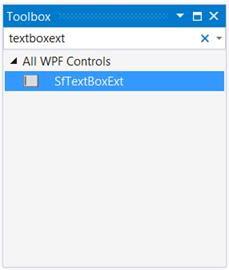
- Drag SfTextBoxExt and drop it in the designer.
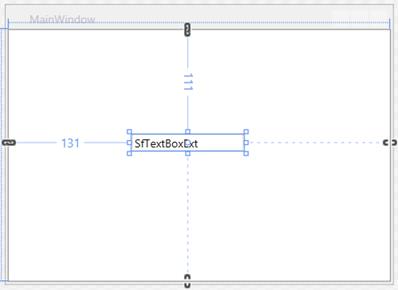
Using XAML
The following steps help you to add a required Essential® WPF Control using XAML Code, for example: SfTextBoxExt.
-
Create a WPF project in Visual Studio and refer the following assemblies:
- Syncfusion.SfInput.WPF.dll
- Syncfusion.SfShared.WPF.dll
-
Include an XML namespace for the above assemblies to the Main window.
<Window xmlns="http://schemas.microsoft.com/winfx/2006/xaml/presentation" xmlns:x="http://schemas.microsoft.com/winfx/2006/xaml" xmlns:syncfusion="http://schemas.syncfusion.com/wpf" /> -
Now, add the SfTextBoxExt control with a required optimal name using the included namespace.
<syncfusion:SfTextBoxExt HorizontalAlignment="Center" Name="textBoxExt1" Margin="10" Height ="20" Width="120" Text="SfTextBoxExt" VerticalAlignment="Center"/>
Using Code-Behind
Syncfusion® UI for WPF can be added at runtime using C# / VB. The following steps help you to add required Essential® WPF control using code. For example: SfTextBoxExt.
-
Create a WPF project in Visual Studio and refer to the following assemblies:
- Syncfusion.SfInput.WPF.dll
- Syncfusion.SfShared.WPF.dll
-
Create an instance of SfTextBoxExt, using its namespace.
Syncfusion.Windows.Controls.Input.SfTextBoxExt textBoxExt1 = new Syncfusion.Windows.Controls.Input.SfTextBoxExt();Dim textBoxExt1 As New Syncfusion.Windows.Controls.Input.SfTextBoxExt() -
Set the Size and Alignment of the control with required value.
textBoxExt1.Height = 20; textBoxExt1.Width = 120; textBoxExt1.Margin = new Thickness(10, 10, 10, 10); textBoxExt1.VerticalAlignment = VerticalAlignment.Center; textBoxExt1.HorizontalAlignment = HorizontalAlignment.Center;textBoxExt1.Height = 20 textBoxExt1.Width = 120 textBoxExt1.Margin = New Thickness(10, 10, 10, 10) textBoxExt1.VerticalAlignment = VerticalAlignment.Center textBoxExt1.HorizontalAlignment = HorizontalAlignment.Center -
Add the created instance to the parent window (or the needed layout panels).
// Here this denotes parent Window this.Content = textBoxExt1;' Here this denotes parent Window Me.Content = textBoxExt1
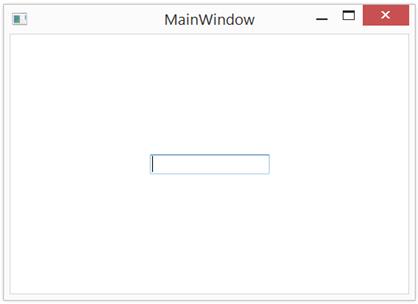
Using Project Template
Syncfusion® provides the Visual Studio Project Templates for the Syncfusion® WPF platform to create Syncfusion® WPF Application.
IMPORTANT
The Syncfusion® WPF templates are available from v16.1.0.24.
Create Syncfusion® WPF project
The following steps direct you to create the Syncfusion® WPF project using the Visual Studio Project Template.
- To create a Syncfusion® WPF project, choose New Project-> Syncfusion->Windows->Syncfusion WPF Application from Visual Studio.
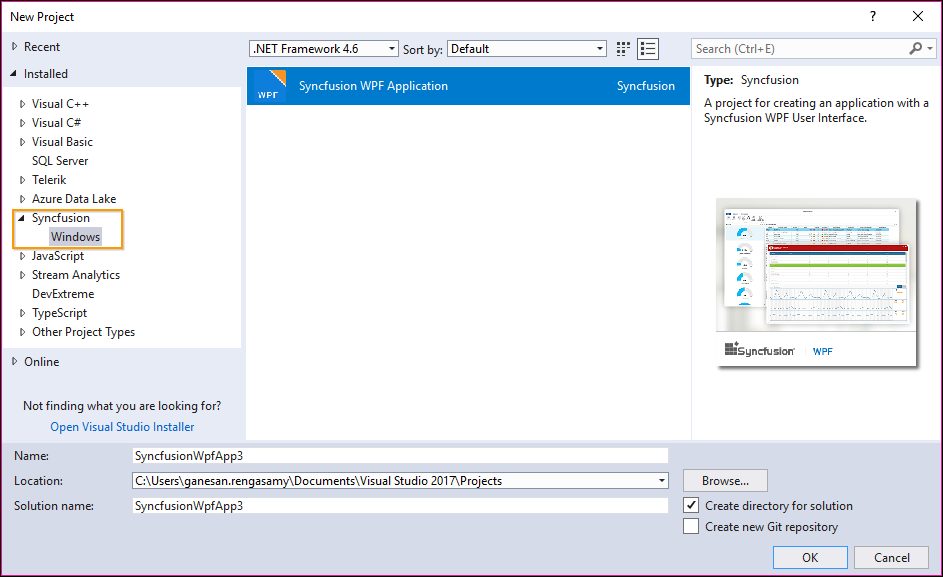
- Name the Project, choose the destination location when required and set the framework of the project, then click OK.
NOTE
Minimum target Framework is 4.0 for Syncfusion® WPF project templates.
- Choose the options to configure the Syncfusion® WPF Application by using the following Project Configuration Wizard.
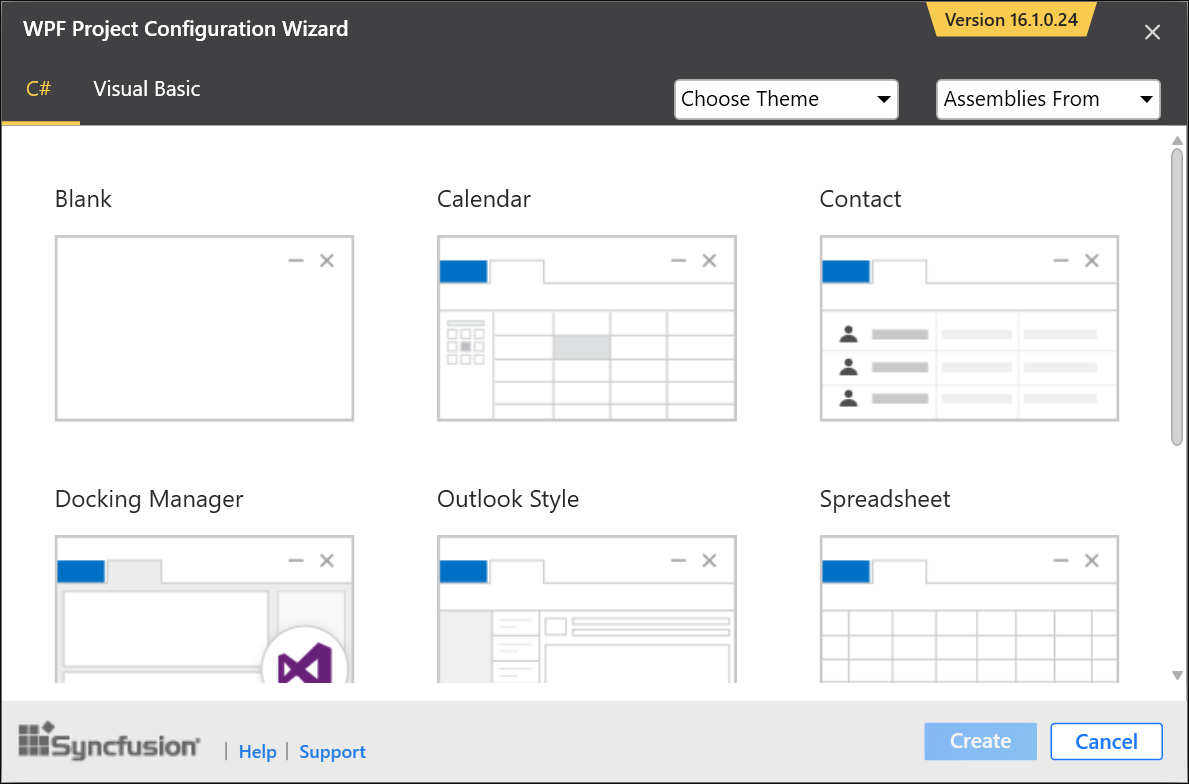
Project configurations
Language: Select the language, either C# or VB.

Choose Theme: Choose the required theme.
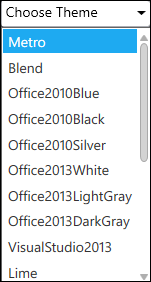
Assemblies From: Choose the assembly location from where it will be added to the project.

Select Control: Choose the control based on your need.
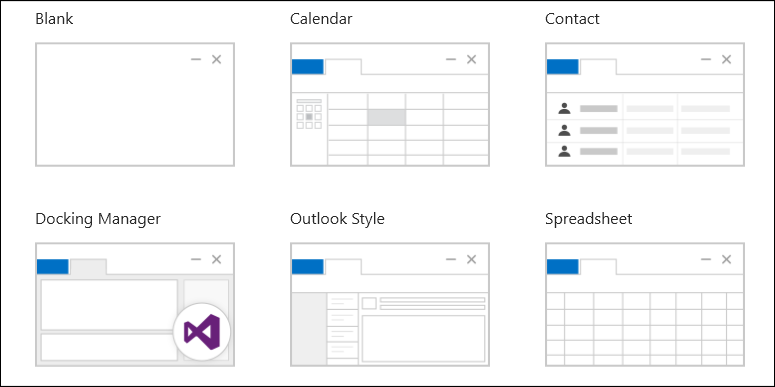
- Once the Project Configuration Wizard is done, the Syncfusion WPF project is created with required references and XAML.
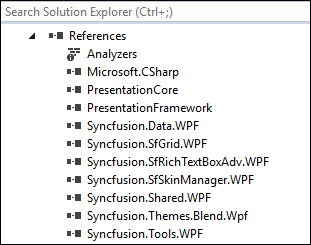
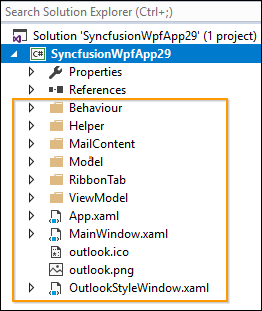
- Then, Syncfusion® licensing registration required message box will be shown as follows, if you have installed the trial setup or NuGet packages since Syncfusion introduced the licensing system with the 2018 Volume 2 (v16.2.0.41) Essential Studio® release. Please navigate to the help topic, which is shown in the licensing message box to generate and register the Syncfusion® license key for your project. Refer to this blog post for understanding the licensing changes introduced in Essential Studio®.
